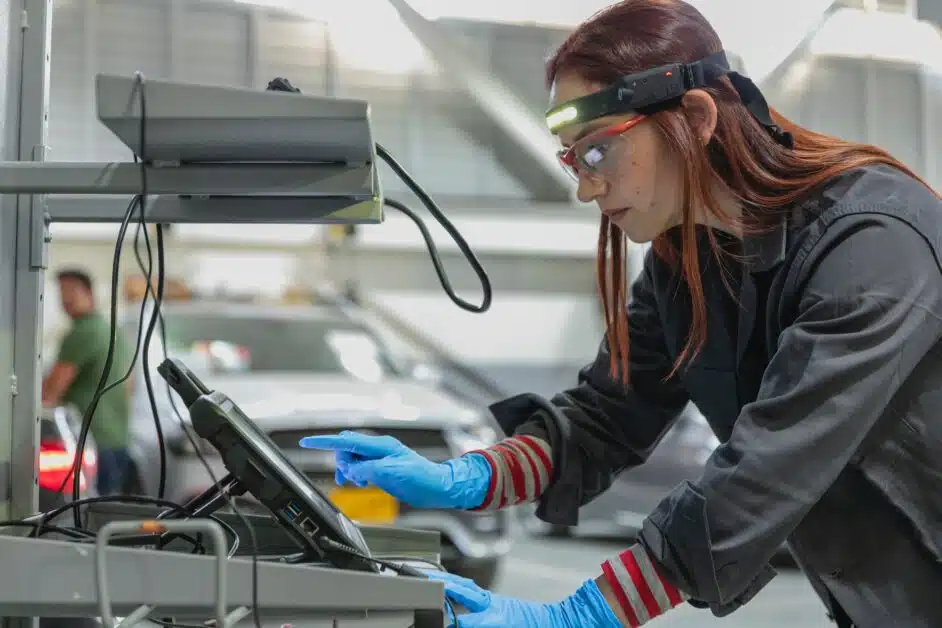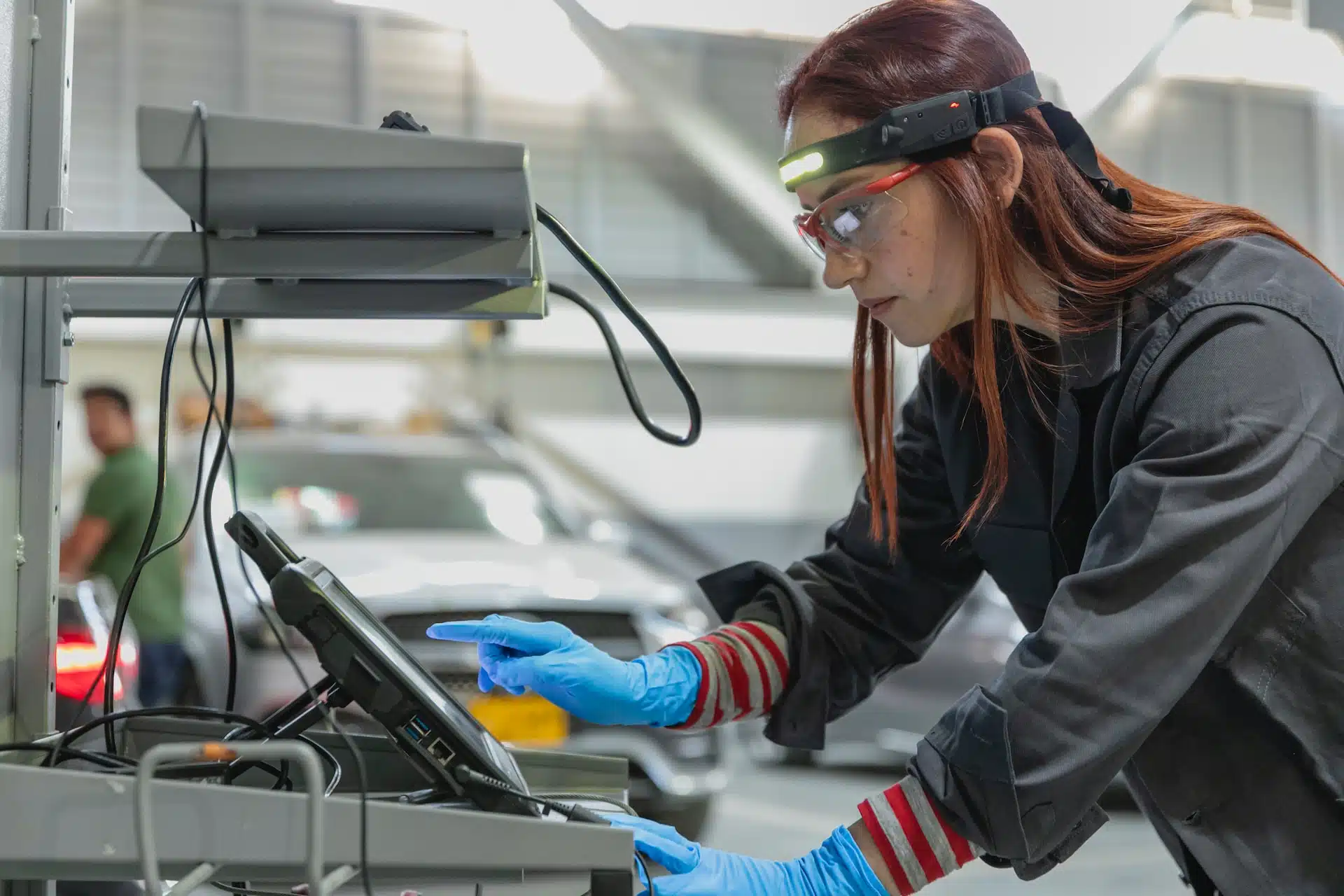
A car diagnostic test is an essential process that helps identify any potential issues with your vehicle’s systems. By connecting your vehicle’s computer to a scanning machine, the test quickly provides valuable information about the health of your car, including the engine, exhaust, transmission, and more. If you notice any unusual issues while driving or if your Check Engine light is on, it is highly recommended to schedule a car diagnostic test.
Key Takeaways
- A car diagnostic test involves connecting your vehicle’s computer to a scanning machine to identify any error codes.
- The test provides valuable information about the health of your vehicle’s systems, such as the engine, exhaust, and transmission.
- If you notice any unusual issues while driving or if your Check Engine light is on, it is a good idea to schedule a car diagnostic test.
- Regular car diagnostic tests can help detect problems early on and prevent costly repairs in the future.
- It is recommended to seek professional help from trained technicians for accurate diagnosis and repairs.
How does a Car Diagnostic Test Work?
A car diagnostic test is a crucial process in identifying and resolving issues with your vehicle. It works by connecting your vehicle’s computer to a specialized scanning machine that analyzes data from various systems and components. This analysis helps generate fault codes, which are then used to pinpoint specific problem areas.
During the test, the scanning machine uses specialized software to monitor features such as the engine, transmission, brakes, and more. It checks for any potential malfunctions or faults and generates diagnostic trouble codes (DTCs) that correspond to specific systems or components. These codes provide valuable information for technicians to accurately diagnose and address the issues.
Accessing the DTCs requires specialized software and equipment. Once the codes are obtained, skilled technicians can interpret the data and use it to determine the necessary repairs or maintenance procedures. Overall, a car diagnostic test is an essential tool in identifying and resolving problems with your vehicle, ensuring its optimal performance and longevity.
Understanding Diagnostic Trouble Codes
| Code Type | Description |
|---|---|
| Body Codes | Relate to issues with the vehicle’s body control module, lighting, airbags, and other body-related systems. |
| Chassis Codes | Relate to problems with the vehicle’s suspension, steering, and braking systems. |
| Powertrain Codes | Focus on malfunctions within the engine, transmission, and emissions systems. |
| Vehicle Network Codes | Indicate issues with the vehicle’s communication networks and modules. |
Diagnostic Trouble Codes (DTCs) play a vital role in the car diagnostic test process. They provide technicians with specific information about the problem areas in the vehicle’s systems. There are various types of DTCs, including body codes, chassis codes, powertrain codes, and vehicle network codes. Each code type corresponds to specific areas or systems within the vehicle.
By understanding the type and meaning of the DTCs, technicians can accurately diagnose and address the issues affecting your vehicle. This ensures that the necessary repairs or maintenance procedures are carried out effectively, restoring your vehicle’s optimal performance.
Benefits of Regular Car Diagnostic Tests
Regular car diagnostic tests provide numerous benefits that can help ensure the optimal performance and longevity of your vehicle. By detecting problems early on, these tests can help you address minor issues before they become major and costly repairs. Here are some key benefits of scheduling regular car diagnostic tests:
- Early Problem Detection: Car diagnostic tests can identify hidden issues in various systems of your vehicle, including the engine, transmission, exhaust, and more. By detecting problems early, you can take preventative measures and avoid potential breakdowns on the road.
- Cost Savings: By addressing minor issues during diagnostic tests, you can avoid expensive repairs in the future. Fixing a small problem early on is typically more affordable than dealing with a major issue that requires extensive repairs or component replacements.
- Improved Performance: Regular diagnostic tests help ensure that your vehicle is operating at its best. By identifying and resolving issues, you can enhance the overall performance and fuel efficiency of your car.
- Enhanced Safety: Unresolved issues in your vehicle can jeopardize your safety on the road. Regular diagnostic tests help identify potential problems that could impact the performance and handling of your vehicle, allowing you to take necessary actions to maintain a safe driving experience.
- Peace of Mind: Knowing that your vehicle has undergone regular diagnostic tests can provide you with peace of mind. It gives you confidence that your car is in good condition and reduces the chances of unexpected breakdowns or malfunctions.
To fully understand the benefits of regular car diagnostic tests, it is important to consult with a trusted professional who can help you interpret the results and advise on necessary repairs or maintenance.
Understanding Diagnostic Trouble Codes
Diagnostic Trouble Codes (DTCs) play a crucial role in car diagnostic tests. These codes are generated by your vehicle’s computer systems whenever a fault or malfunction is detected. By accessing and analyzing these codes, technicians can identify the specific problem areas and provide effective repairs or maintenance.
There are over 200 DTCs, each corresponding to a specific system or component in your vehicle. These codes are categorized into body codes, chassis codes, powertrain codes, and vehicle network codes. By categorizing the codes, technicians can narrow down the potential issue and focus on the relevant system or component.
For example, a powertrain code might indicate a problem with the engine or transmission, while a chassis code might point to issues with the braking or steering systems. By understanding the meaning of these codes, technicians can diagnose the problem more accurately and efficiently.
| DTC Category | Description |
|---|---|
| Body Codes | Related to the body and interior systems, such as the airbags, climate control, or lighting. |
| Chassis Codes | Related to the chassis and suspension systems, including the brakes, steering, and tires. |
| Powertrain Codes | Related to the engine, transmission, and drivetrain systems. |
| Vehicle Network Codes | Related to communication issues within the vehicle’s network systems. |
Accessing and interpreting diagnostic trouble codes is an essential part of the car diagnostic test process. By understanding these codes, technicians can effectively diagnose and address the underlying issues, ensuring the proper functioning and performance of your vehicle.
Time and Cost of Car Diagnostic Tests
A car diagnostic test is typically a quick procedure that can be completed within minutes. The actual time may vary depending on the complexity of the issue and the equipment used. During the test, specialized software analyzes the data from your vehicle’s computer systems and components to identify any potential problems. The test generates fault codes that help technicians pinpoint the specific areas that need attention.
The cost of a car diagnostic test can vary depending on various factors, including the location and the type of establishment where it is performed. In the United Kingdom, the standard cost ranges between £50-£100. It is important to note that this cost may only cover the diagnostics, and additional charges may apply if repairs or further inspections are needed. It is recommended to inquire about the cost beforehand and have a clear understanding of what is included in the diagnostic test.
Having regular car diagnostic tests is essential for maintaining the optimal performance and longevity of your vehicle. These tests can help detect potential issues early on before they escalate into major problems, saving you money in the long run. By addressing minor issues promptly, you can prevent costly repairs and ensure that your vehicle remains in good working condition.
Additionally, car diagnostic tests can be part of comprehensive maintenance checks or as recommended in your vehicle’s owner’s manual. Regular diagnostic tests can identify hidden problems and provide valuable insights into the health of various systems in your car, including the engine, transmission, exhaust, and more. It is always better to address small problems early on rather than waiting for them to worsen.
DIY Car Diagnostic Tests
Performing a DIY car diagnostic test can be a cost-effective option if you have the necessary knowledge and equipment. However, it’s important to note that DIY tests may have limitations compared to professional diagnostic services. They can be useful for basic troubleshooting or identifying minor issues, but for more complex problems or accurate diagnosis, it is recommended to seek professional help from trained technicians who have access to specialized software and equipment.
When conducting a DIY car diagnostic test, refer to your vehicle’s owner’s manual for instructions specific to your make and model. This will ensure that you follow the correct steps and avoid any potential mistakes. It’s also essential to have the right diagnostic tools, such as a scanning device or code reader, to retrieve and interpret the error codes generated by your vehicle’s computer systems.
During a DIY car diagnostic test, you can check for common issues like a loose gas cap, battery problems, or faulty sensors. However, keep in mind that not all issues can be easily identified through a DIY test. Some problems may require advanced equipment or professional troubleshooting to accurately diagnose and repair. If you’re unsure about the results of your DIY diagnostic test or if the issue persists, it’s best to consult with a qualified technician for further assistance.
Table: Pros and Cons of DIY Car Diagnostic Tests
| Pros | Cons |
|---|---|
| Cost-effective option | Limited diagnostic capabilities |
| Basic troubleshooting for minor issues | May lead to misdiagnosis and improper repairs |
| Convenience of testing at your own pace | Requires knowledge and understanding of diagnostic tools |
| Initial step before seeking professional help | May not identify complex or hidden problems |
When to Schedule a Car Diagnostic Test
If you notice any unusual issues while driving your vehicle or if your Check Engine light is on, it is recommended to schedule a car diagnostic test. These tests can help identify potential problems and prevent them from escalating into major issues. Common signs that indicate the need for a diagnostic test include rough idle, stalling, hesitation, or other drivability issues.
In addition to addressing specific problems, scheduling regular diagnostic tests can be part of comprehensive maintenance checks or as recommended in your vehicle’s owner’s manual. By conducting these tests on a regular basis, you can detect minor issues before they worsen, potentially saving you from costly repairs down the line.
Furthermore, regular diagnostic tests play a crucial role in preventive maintenance. They help ensure the longevity of your vehicle and optimize its performance. By proactively identifying and addressing small problems early on, you can prevent them from developing into more significant issues that could affect the overall reliability and safety of your car.
Benefits of Scheduling Car Diagnostic Tests:
- Identify potential problems early on
- Prevent costly repairs in the future
- Maintain optimal performance of your vehicle
- Enhance overall reliability and safety
Scheduling regular car diagnostic tests is a proactive approach to vehicle maintenance. By staying on top of potential issues, you can keep your car running smoothly and avoid unexpected breakdowns on the road.
| Signs that indicate the need for a diagnostic test: | Benefits of regular diagnostic tests: |
|---|---|
| Rough idle | Early problem detection |
| Stalling | Prevention of costly repairs |
| Hesitation | Maintenance of optimal performance |
| Drivability issues | Enhancement of overall reliability and safety |
Importance of Car Diagnostic Tests for Preventive Maintenance
Car diagnostic tests play a crucial role in preventive maintenance. By regularly conducting diagnostic tests, you can detect minor issues before they turn into major problems. This helps prevent costly repairs and ensures the longevity of your vehicle. Diagnostic tests can reveal hidden issues in your vehicle’s systems, such as the engine, transmission, exhaust, and more. It is always better to address small problems early on rather than waiting for them to escalate.
Why are Car Diagnostic Tests Important for Preventive Maintenance?
Preventive maintenance is essential for keeping your vehicle in optimal condition and avoiding unexpected breakdowns. Car diagnostic tests are an integral part of preventive maintenance as they provide valuable insights into your vehicle’s health. By detecting issues early on, you can take proactive measures to resolve them, preventing further damage and potential safety risks.
Car diagnostic tests can help identify a wide range of problems, including engine malfunctions, transmission issues, exhaust system faults, and more. They provide detailed information about error codes and fault indicators, enabling technicians to diagnose the root cause of the problem accurately. This allows for targeted repairs and maintenance, saving you time and money in the long run.
The Benefits of Regular Car Diagnostic Tests
- Detect minor issues before they become major problems
- Prevent costly repairs
- Ensure optimal performance and longevity of your vehicle
- Identify hidden issues in various systems
Table: Comparative Analysis of Car Diagnostic Tests
| Factors | Professional Diagnostic Tests | DIY Diagnostic Tests |
|---|---|---|
| Accuracy | High | Variable – depends on the individual’s knowledge and equipment |
| Complexity of Problems Detected | Wide range of issues can be identified | Basic troubleshooting and detection of minor issues |
| Specialized Tools and Software | Utilizes advanced diagnostic tools and software | Requires investment in diagnostic tools |
| Expertise | Performed by trained technicians | Depends on individual’s knowledge and experience |
| Cost | May incur professional service fees | Potential cost savings by performing tests at home |
While DIY diagnostic tests can be useful for basic troubleshooting, professional car diagnostic tests offer a higher level of accuracy and expertise. Trained technicians have access to specialized tools and software that can detect a wide range of issues, ensuring comprehensive assessments of your vehicle’s health.
Finding Reliable Car Diagnostic Services
When it comes to ensuring the health and performance of your vehicle, finding reliable car diagnostic services is essential. Whether you’re facing a specific issue or simply want to maintain your vehicle’s optimal condition, professional diagnostic services can provide valuable insights and solutions.
When searching for diagnostic services, it’s important to consider the expertise and experience of the technicians. Look for certified professionals who are knowledgeable about various vehicle makes and models. This ensures that they have the necessary skills to accurately diagnose and address any issues your vehicle may have.
In addition to expertise, it’s crucial to choose a reputable establishment or technician that has access to advanced diagnostic tools and equipment. These tools enable technicians to efficiently and accurately identify any problems with your vehicle’s systems. Reading reviews and asking for recommendations can also help you find reliable services that have a proven track record of customer satisfaction.
Remember, regular car diagnostic tests can help you detect potential problems before they worsen, saving you time, money, and stress in the long run. By finding a reliable car diagnostic service, you can ensure that your vehicle receives the necessary care it deserves, keeping it in top-notch condition for years to come.
FAQ
What is a Car Diagnostic Test?
A car diagnostic test is a process that involves connecting your vehicle’s computer to a scanning machine to identify any error codes. It provides valuable information about the health of your vehicle’s systems and helps technicians pinpoint specific problem areas.
How does a Car Diagnostic Test Work?
During a car diagnostic test, specialized software is used to analyze the data from your vehicle’s computer systems and components. This software monitors various features to identify potential issues and generates fault codes that help with repairs or maintenance.
What are the Benefits of Regular Car Diagnostic Tests?
Regular car diagnostic tests can help detect problems early on before they require expensive repairs. By addressing minor issues, you can save money and ensure optimal performance. These tests can uncover issues related to various systems in your car.
What are Diagnostic Trouble Codes (DTCs)?
Diagnostic Trouble Codes are codes generated by your vehicle’s computer systems when a fault or malfunction is detected. They help technicians identify specific problem areas during a car diagnostic test. There are over 200 DTCs categorized into body codes, chassis codes, powertrain codes, and vehicle network codes.
How much time does a Car Diagnostic Test take and how much does it cost?
Car diagnostic tests are generally quick and can be completed within minutes. The actual time may vary depending on the complexity of the issue and the equipment used. The cost can vary depending on the location and the type of establishment, ranging between £50-£100 in the UK.
Can I perform a Car Diagnostic Test at home?
It is possible to perform a car diagnostic test at home if you have the necessary knowledge and equipment. DIY tests can be useful for basic troubleshooting or identifying minor issues. However, for more complex problems or accurate diagnosis, it is recommended to seek professional help.
When should I schedule a Car Diagnostic Test?
It is recommended to schedule a car diagnostic test if your Check Engine light is on or if you notice any abnormal issues while driving. Common signs that indicate the need for a diagnostic test include rough idle, stalling, hesitation, or other drivability issues.
How important are Car Diagnostic Tests for Preventive Maintenance?
Car diagnostic tests play a crucial role in preventive maintenance. By regularly conducting diagnostic tests, you can detect minor issues before they turn into major problems. This helps prevent costly repairs and ensures the longevity of your vehicle.
How can I find reliable Car Diagnostic Services?
When looking for reliable car diagnostic services, it is important to choose a reputable establishment or technician. Consider their expertise, experience, and access to advanced diagnostic tools and equipment. Reading reviews and asking for recommendations can also help you find reliable services.


